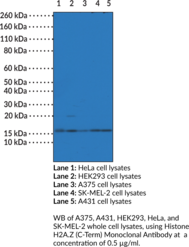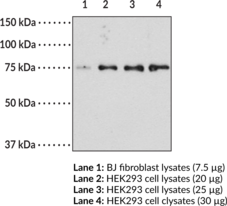Description
Histone H2A.Z is a variant of histone H2A, a nuclear protein and a component of the nucleosome core.{59522,57056} It is a globular protein containing unstructured N- and C-terminal tails that extend outside of the nucleosome core that are subject to a variety of post-translational modifications (PTMs), including acetylation, methylation, and ubiquitination, which function as epigenetic regulators of transcription.{58069} Histone H2A.Z influences chromatin accessibility and nucleosome stability, regulating various cellular functions, including DNA replication and repair, mitosis, heterochromatin formation, and chromosome segregation.{59522,59512} It is enriched at gene promoters and associated with active or repressed gene transcription in a manner dependent on species or PTMs, among other factors.{59526,59512} Increased tumor H2A.Z levels are associated with decreased overall survival in patients with breast cancer.{59527} Cayman’s Histone H2A.Z (C-Term) Monoclonal Antibody can be used for ELISA, immunocytochemistry (ICC), multiplex-based assay, and Western blot (WB) applications. The antibody recognizes the C-terminal region of histone H2A.Z independent of PTMs.
Synonyms: H2AZ
Immunogen: Peptide from the C-terminal region of human histone H2A.Z
Formulation: 100 µg of protein A-affinity purified monoclonal antibody
Isotype: IgG
Applications: ELISA, ICC, multiplex-based assays, WB
Origin:
Stability: 365 days
Application|ELISA||Application|Immunocytochemistry||Application|Multiplex||Application|Western Blot||Product Type|Antibodies|Monoclonal Antibodies||Research Area|Epigenetics, Transcription, & Translation|Histones/Histone Peptides|Unmodified Histones



